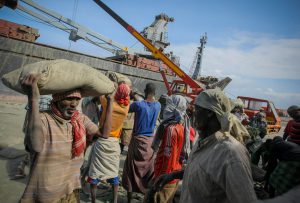


An East African terrorist group has banned plastic bags out of concern for the health of the environment, a bizarre irony that demonstrates the importance of honoring human dignity. Al Shabaab is a terrorist group affiliated with Al Quaeda that currently occupies regions of Somalia and is apparently very worried about the environmental impact of plastic bags on livestock. Who knew terrorists could be so conscientious? This, of course, is the same Al-Shabaab that has carried out horrific attacks throughout East Africa that have killed thousands.
The absurdity of the announcement attracted immediate attention, with various internet users mocking Al Shabaab for the decision. Music, movies, certain television channels, satellite dishes, and cooperation with humanitarian organizations have also been banned by the group.
Plastic bags, according to messages posted on a Twitter account affiliated with Al Shabaab, “pose a serious threat to the well-being of humans and animals alike.” As a terrorist organization, they do not exactly have authority to do this, but their habit of causing wanton harm and destruction gives them a de facto authority.
Al-Shabaab’s claims that this ban is out of concern for the well-being of humans seems contrived at best. The UK Independent says that al-Quaeda and other allied groups have “long been vocal about environmental issues.” Despite their apparent consistency in message, there is still a serious moral discrepancy in caring for the environment while simultaneously scorning human life. If Al-Shabaab wants to do something for the well-being of people in Somalia, they might consider allowing humanitarian efforts. As one medical student in Mogadishu told the New York Times, “I see [the plastic bag ban] as a good decision, but they must ask themselves: Why do they also ban humanitarian workers from operating in Shabab-controlled areas?”
A deadly terrorist group banning plastic bags misses the point of environmental stewardship. We have to consider the dignity of the human person even in our efforts to save the environment, or else we will forget that we are saving the earth for human beings to flourish more fully. Last month, the city of Berkeley did just this when it suggested “humane population stabilization” in order to temper a “climate emergency.”
Taking care of the environment is good and it probably wouldn’t hurt us if we all made a more conscious effort to re-use our plastic bags or clean up the neighborhood, but let’s start by not blowing each other up first.
Update: Al-Shabaab’s claim that the ban is out of concern for the “well-being of humans” seems even more unconvincing in light of the group’s attack on Somalia’s interior ministry on June 7.
(Photo: Flickr, CCO Public Domain)









